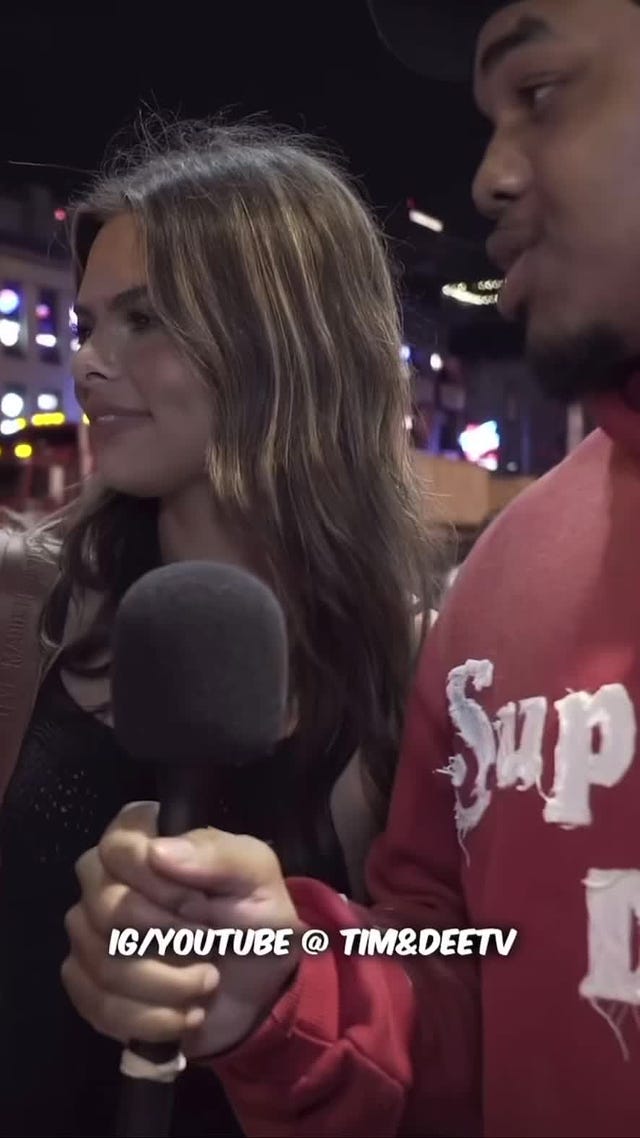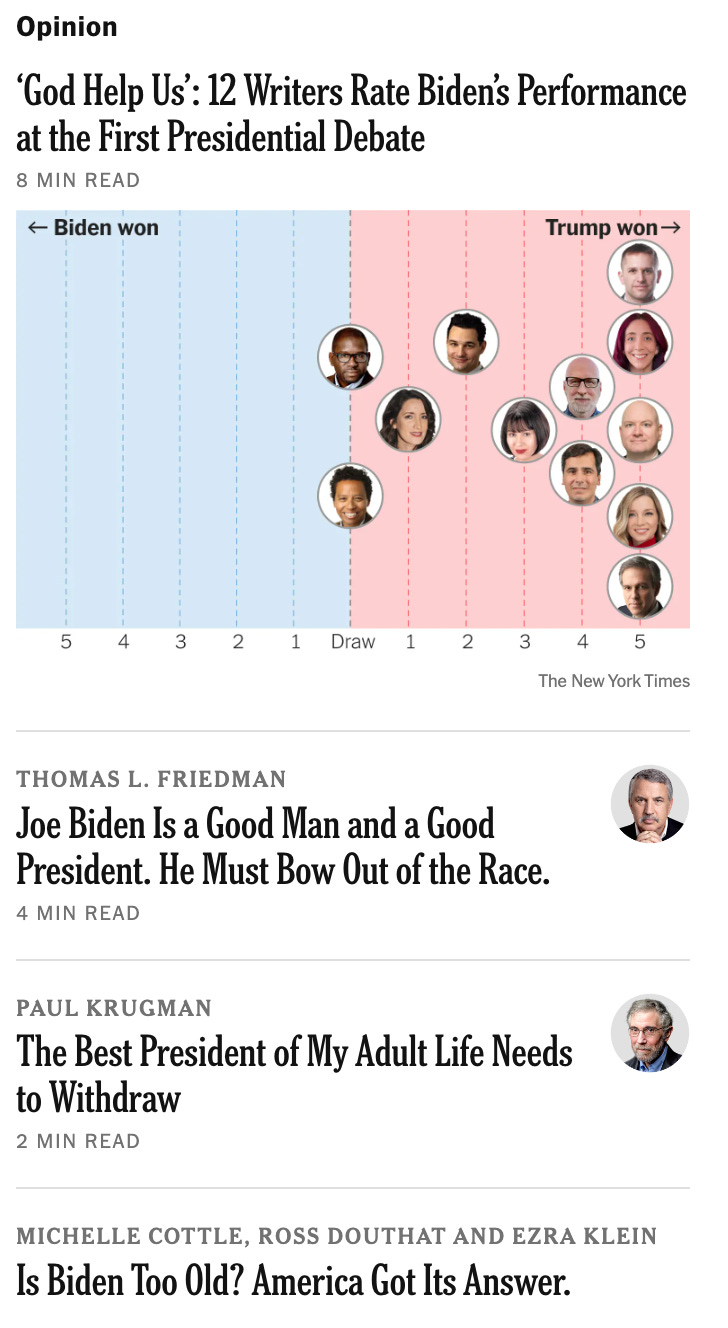Greetings from Read Max HQ! In today’s newsletter:
I explain the “Hawk Tuah” meme and explore the new but familiar online subculture from which it emerged, and
I back myself into a doubly contrarian opinion about the presidential debate that probably doesn’t stand up to scrutiny.
A reminder: Read Max is entirely funded by readers, who for whatever reason (prion disease) enjoy reading reporting, criticism, analysis, and shitposting about things on and relating to the internet every week. It’s a full-time job to produce this newsletter, even on weeks where, say, my son has a fever and has to stay home from school for the first three days of the week and then as soon as he’s better the school year ends and I don’t have childcare for two days in a row, and every new subscriber makes a real difference to my ability to write week in and week out. If you like this writing--if you find it informative, enlightening, entertaining, or if you just think it’s good that it exists--please consider becoming a paid subscriber:
Hawk Tuah and the Zynternet
“Hawk Tuah,” if you are not yet familiar, is a newly popular onomatopoeic meme, derived from a street-interview video in which a woman in Nashville named Hailey Welch responds to the question “what move in bed makes a man go crazy every time?” with “You gotta give ’em that hawk tuah and spit on that thing!”
A description doesn’t really do her delivery justice; you gotta watch the video to get the idea (if you are in a public place please turn the sound way up and maybe gather everyone else around your computer to watch):
Welch and her catchphrase have gone, to borrow a BuzzFeed term of art, megaviral: “Hawk Tuah” is a near-constant trending topic on Twitter as well as the subject of custom truck vinyl, a tattoo, and, of course, hundreds of hastily assembled S.E.O. splogs. As is standard with viral characters, false rumors (started by a “parody” Facebook news account) have already spread that she’d been fired from a daycare teaching job over the video, and alternately that she’d signed with Hollywood power agency UTA. But so far, all that’s happened is that Welch has embraced and monetized her fame with a clothing line for people with poorly developed senses of self.
It’s not precisely a mystery why a video of a cute girl making raunchy jokes would attract attention online, but Welch is funny and charming beyond what’s required of the role, and in many ways Hawk Tuah feels like a comforting throwback to an earlier generation of viral videos--“I like turtles,” say, or “backin up backin up,” or even “Damn, Daniel,” in which a regular person acts memorably and unexpectedly goofy and coins a recognizable catchphrase that can adopted easily by people on the internet who are too busy or dull to come up with their own jokes, which, whatever else you might say, is vastly preferable to viral videos that consist of a group of magicians enacting a bizarre skit for occult Facebook-algorithm reasons.
But Hawk Tuah’s broad success as a meme is less about its own intrinsic qualities than about the increasing size and cultural power of something I’m going to call the Zynternet.
Over the last ten years or so, a broad community of fratty, horndog, boorishly provocative 20- and sometimes (embarrassingly) 30-somethings--mostly but by no means entirely male--has emerged to form a newly prominent online subculture. This network is adjacent to the “sports internet” of 40something dads and the “hustle internet” of Miami crypto bullshit and the “reactionary internet” of trad influencers, but is its own distinct community with its own distinct cultural referents--college sports, gambling, light domestic beers, Zyn nicotine pouches--and influential personalities and media outlets, among them Dave Portnoy, Pat McAfee, Antonio Brown, and Call Her Daddy, in addition to dozens of minor podcasters and hey-fellow-kids content creators who nearly all work for sports-betting concerns.
To get a sense of the kind of cultural network I’m talking about, consider that someone yelled “HAWK TUAH!” after a nice Bryson DeChambeau drive at LIV Nashville over the weekend. That is: the Zynternet is made up of the kind of guys, and I say this without judgment, who have a favorite professional golfer, and moreover the kind of guys whose favorite pro golfer is Bryson DeChambeau, and moreover the kind of guys who would go to a LIV golf event, in Nashville, to see Bryson DeChambeau hit, and most of all, the kind of guys who would loudly shout a three-day-old meme about oral sex to celebrate their favorite pro golfer Bryson DeChambeau at the LIV golf event in Nashville.1 (Consider also that Conor MacGregor was an immediate participant in the meme frenzy.) You could probably communicate the basic contours of this community simply by calling it “Frat Internet” or “Barstool Internet” or “Dumbass Parlay Bet Internet” or “Internet Made Up Of Guys Who Send Annoying Whiny Replies to AOC Or Whoever And When You Click On Their Profiles It’s Like 1000s Of Retweets Of Stories About The LSU Football Program.” But you don’t become one of the top 16 “Technology” newsletters on Substack by leaving neologisms like “The Zynternet” on the table.
I am interested in the Zynternet because, even if it’s a pretty familiar subculture in the real world, its online prominence feels like a genuinely new phenomenon.2 There have always been college-sports fans on the internet, consigned to some of the worst message boards you can possibly imagine, but it’s only in the past decade that the internet has become so ubiquitous and culturally hegemonic that it’s been able to sustain a large population of current and former fraternity members, degenerate gamblers, and Southern party girls, and in turn to convince those people to participate actively in the culture of social media.
But these groups may never have really been organized into a subculture absent two other important developments: The first is Elon Musk’s takeover of Twitter, which has been extremely beneficial to all kinds of demonstratively macho subcultures for reasons that have been discussed ad nauseaum. The second is the legalization of sports gambling in many states, which has flooded media properties that cater to Zynternet demographics with cash, either as advertisers or often as owners.
The result is an internet culture that is on the whole much frattier than it was in 2014. I would say “for better and for worse” but I’m not exactly sure what the “for better” part is. While Hawk Tuah in and of itself is relatively benign, and Welch seems to be a happy and remunerated participant in her own viral fame, the other meme spreading across the Zynternet this week was the name and photo of a girl whom an anonymous account claimed, apparently arbitrarily, slept with “35 percent of the SEC.” This happened on “the Burnerverse,” a network of anonymous Zynternet Twitter accounts seemingly dedicated to reproducing 4chan with southern-frat characteristics. The “good news,” such as it is, is that while the Zynternet is broadly conservative, it’s never quite as committed, partisan, or ideological as some of its adjacent networks would like.3 The bad news is that its main belief system is a kind of epicurean libertarianism (protect Zyn at all costs) combined with an all-purpose misogyny.
I know no one cares but I am compelled by poster’s disease to reveal my thoughts on the presidential debate
One of my most successful and enduring heuristics for understanding American politics is “taking the opposite position of the collective conventional wisdom of New York Times op-ed columnists.” At the same time, one of my key beliefs about the 2024 election is that Joe Biden should not be running for a second term. Today’s headlines therefore leave me confused and unsure: Am I wrong? Or, for the first time in history, have Times columnists collectively arrived at the correct conclusion?
It’s true that if anyone could reverse-polarize me into Biden dead-enderism it’s the Times op-ed page, but it’s basically impossible to watch even a portion of last night’s debate (let alone to have paid attention to anything the administration has done since 2022) and come away with the conclusion that he should be president right now, let alone that he should be running to be president again for the next four years.
Where I think the Times columnists--and other elite pundits and close followers of political news--are wrong is in the idea that this debate was particularly bad for Biden in terms of his broad electoral support. The panic they are feeling is because they might be the only people in the country to have just now realized that Biden is too old to be running for president. Most voters have known that he’s too old for months. It’s why he’s losing in all the polls! Why would a debate that merely confirmed what everyone already knows move the needle very much?
Is “Biden should be replaced but the debate was actually fine from an election perspective” a very stupid doubly contrarian position I’ve triangulated myself into? Yes. But who are you going to trust, me, or a Times columnist?
Update 6/29: It has been suggested to me that the person shouting “Hawk Tuah” was actually heckling DeChambeau over his feud with Brooks Koepka, but I think if that’s true than my point stands even further.
Update 6/29: Since publication many people (beginning with Mark Slutsky, in the comments below) have pointed out that the horny-frat-dork site The Chive is an important antecedent to the Zynternet. I agree that it should have been mentioned--in many ways the Zynternet is like if you took all traces of Reddit out of The Chive--but a full genealogical account of Zynternet prehistory is outside the scope of this newsletter. For more on the Chive I highly recommend Jordan Larson’s 2013 Awl piece on the subject.
One of the funniest things about Hawk Tuah has been the attempts of thirsty reactionary ideologues to make this blowjob meme a specifically right-wing blowjob meme. “Hawk Tuah is actually based and anti-woke,” writes Ian Miles Cheong, who has tweeted about Hawk Tuah 15 times from his gamer chair in Ipoh, “because more people are talking about it than they are about Pride. Pride has been defeated.”












One component of the Zynternet I feel compelled to mention is the evolution of the Rogan-sphere to an assortment of comedy, sports, and 'lifestyle' podcasts on YouTube that have taken off since the pandemic. These podcasts are usually one degree of separation from Dana White. While the politics in these circles has always been implicit, actual politicians have started coming on these podcasts. Trump went on Full Send last year and got 8M views on YouTube, while he went on Logan Paul's podcast two weeks ago with 5M views so far. RFK has also done the rounds here - going on Theo Von's podcast (1.1M views), Matt and Shane's Secret Podcast (555K views), Lex Fridman's podcast (3.5M views) and Andrew Schulz's podcast (1.5M views) in the past year. Full Send interviewed the mayor of Miami last year (1.1M views). I don't think there's a 'left-wing' equivalent of this universe.
Maybe none of this matters and this is an audience that would have voted this way anyway, but it's at least interesting to me to have politicians being able to speak to millions of young people directly, for an hour or more, completely unfettered. I don't think the effect is negligible!
i randomly listened to a 2018 episode of time crisis yesterday, wherein ezra koenig and jake longstreth discuss how "fratty" had contemporaneously replaced "dorky" as the thing everyone can and does deride. specifically, the "played out" impulse to rely on quotes from stuff like the big lebowski; when jake was in high school he quoted ghostbusters and was a dork, and at the time of recording he quoted the big lebowski and was a new kind of dork. i love time crisis because i have a crush on ezra koenig (sorry) but also because i love witnessing men learning truths in real time and being genuinely excited by them. this discussion about frattiness leads ezra to say: "i think something happens when something becomes like a really like iconic cult--it's like happening with rick and morty now--where people like are really into it and ride for it and then it becomes a stereotype, 'oh the type of person who's obsessed with that is so annoying,' and then suddenly it casts this weird shadow on the thing itself...which it shouldn't."
he's on the right track: quoting anything , or, as he goes on to say, smoking weed, are not substitutes for actually engaging with culture or having a sense of self, but being overly critical of people who are a little too into to the office, say, is also a little mean spirited. he never really lands, but the conclusion, which i agree with, seems to be that "letting people enjoy things" is a difficult but important line to walk, because our culture is far too alienated and mean to take everything out on people who derive so much unabated joy from dumb stuff, but sometimes the stuff is so dumb it is harmful (e.g. marvel).
from 2016-2019 this cycle was constant: fratty/dork mainstream culture takeover > "cool people" bully tinder profiles with the office quotes > frat guys double down > cool people (rightfully) re-negotiate how to more meaningfully walk the line. all of this is related, somehow, to the way people reacted to trump being funny between 2015-2019 ("is it ok that he is so funny??"). what i find curious about the rebirth of this kind of posting in 2024 (huak tuah, portnoy), is that it has pivoted from profoundly sexless (the office) to almost always explicitly fetishistic (viral video about oral sex, portnoy's whole thing is being hot, kind of, "call her daddy"). i also think its interesting that the exact same kind of lack-of-sense-of-self aesthetic is uncannily paralleled in leftist/"brat summer" spheres in, like, jack schlossberg.
maybe since everyone started shamelessly admitting that trump is the funniest guy of all time, internet subcultures have lost their edge and the dorkish venn diagram has started closing in on itself, and every kind of person has just resorted to manically saying "i'm horny" via regurgitating viral one-liners. in any case, thank you so much to putting a name to the call-her-daddy-ification of memes, a specifically post-tiktok and post-covid aesthetic mode that is so hard to describe, especially in conversation with its more simple post-2016 counterpart.